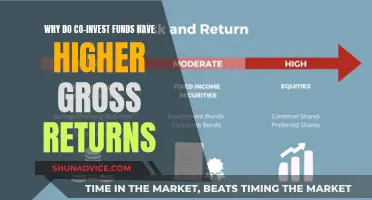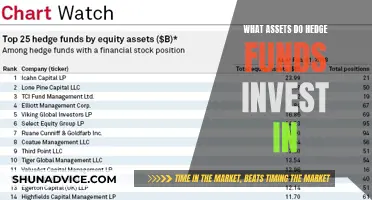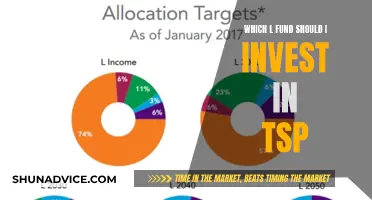Index funds are a type of investment fund that tracks the performance of a market index, such as the S&P 500 or the Nasdaq Composite. They are designed to mirror the performance of financial market indexes and are ideal for long-term investing. Index funds are a passive investment strategy, meaning they don't require active management, and they are known for having lower fees than actively managed funds. When investing in index funds, it's important to consider factors such as the fund's performance history, management fees, and the index it tracks.
| Characteristics | Values |
|---|---|
| Type of fund | Mutual fund or exchange-traded fund (ETF) |
| Investment strategy | Passive |
| Investment aim | To replicate the performance of a market index, e.g. S&P 500 |
| Benefits | Low cost, diversification, tax efficiency, minimal investment research required |
| Risks | Lack of flexibility, potential for underperformance, market risk |
| How to invest | Choose investment platform, open and fund account, select fund, buy shares, monitor and adjust |
What You'll Learn

Understand the basics of index funds and how they work
Index funds are a type of mutual or exchange-traded fund (ETF) that tracks the performance of a market index, such as the S&P 500, by holding the same stocks or bonds or a representative sample of them. They are defined as investments that mirror the performance of benchmarks like the S&P 500 by mimicking their makeup. Index funds are passive investments, using a long-term strategy without actively picking securities or timing the market. They are designed to replicate the performance of financial market indexes.
Index funds are a popular choice for investors seeking low-cost, diversified, and passive investments that tend to outperform many higher-fee, actively traded funds. They are ideal for long-term investing, such as retirement accounts. Index funds are also well-suited for ordinary long-term investors.
Index funds have risen in popularity in recent years, accounting for about half of all U.S. fund assets in 2023, up from just 21% in 2012. This is due to their low costs, broad diversification, and consistent performance.
Index funds are available for nearly every part of the financial market. They can be used to invest in specific sectors or types of stocks, bonds, and other fixed-income investments. The most popular index is the S&P 500, which includes 500 of the top companies in the U.S. stock market. Other popular indexes include the Dow Jones Industrial Average, the Nasdaq Composite, and the Russell 2000.
When investing in index funds, it is important to consider the fund's fees and performance. Index funds typically have lower fees than actively managed funds, as they require less work and trading. However, it is still important to review a fund's expense ratio and other costs before investing.
Overall, index funds offer a simple, low-cost way to gain exposure to a broad, diversified portfolio, making them a good option for beginners and experienced investors alike.
Hedge Fund Investing in Singapore: A Comprehensive Guide
You may want to see also

Research and analyse different index funds
Researching and analysing different index funds is a crucial step in the investment process. Here are some key factors to consider:
Index Fund Basics
- Index Type: Index funds can track various indexes, such as the S&P 500, Dow Jones Industrial Average, Nasdaq Composite, or Russell 2000. Each index focuses on different segments of the market, such as large U.S. stocks, small U.S. stocks, international stocks, or bonds.
- Fund Type: Index funds are typically offered as mutual funds or exchange-traded funds (ETFs). Mutual funds have higher investment minimums and trade once a day, while ETFs are traded on exchanges like stocks and offer more trading flexibility.
- Fund Provider: Consider the reputation and reliability of the fund provider, such as Vanguard, Fidelity, or iShares.
Costs and Fees
- Expense Ratio: This is a critical factor in evaluating index funds. Compare the expense ratios of funds tracking the same index, as they can vary significantly. Look for funds with lower expense ratios to maximise your returns.
- Investment Minimum: Note the minimum investment required for each fund, which can range from nothing to a few thousand dollars.
- Trading Costs: Consider the trading costs associated with buying or selling the fund. Mutual funds typically have higher trading costs than ETFs.
Performance and Risk
- Long-Term Performance: Evaluate the fund's performance over an extended period, ideally five to ten years. While past performance doesn't guarantee future results, it provides a useful gauge.
- Tracking Error: Compare the fund's returns with the performance of its benchmark index. A wide tracking error may indicate challenges in managing the fund's holdings effectively.
- Diversification: Assess the level of diversification offered by the index fund. A well-diversified fund invests in a broad range of companies across different sectors and industries, reducing the risk associated with individual stocks.
- Risk Profile: Consider the risk associated with the index fund, especially if it focuses on a specific sector or industry. Diversification can help mitigate risk, but some indexes are inherently more volatile than others.
Suitability
- Investment Objectives: Ensure the index fund aligns with your investment goals and risk tolerance. For example, if you want exposure to a specific sector or country, look for funds specialising in those areas.
- Tax Efficiency: Index funds are generally tax-efficient due to their low turnover ratios. However, mutual funds may have taxable capital gains distributions at the end of the year, while ETFs do not.
Remember to consider your own financial situation and risk tolerance when evaluating different index funds. Conduct thorough research, compare multiple funds, and make informed decisions based on a range of factors to find the best fit for your investment portfolio.
Dex Funds: A Guide to Investing in Decentralized Exchanges
You may want to see also

Decide which index fund to buy
When deciding which index fund to buy, there are several factors to consider.
Firstly, you should consider the type of index fund you want to invest in. There are two main types of index funds: mutual funds and exchange-traded funds (ETFs). Mutual funds can be purchased directly from the fund company or through a broker, whereas ETFs are traded on a stock exchange and require a demat account.
Next, you should research and analyse different index funds to find one that aligns with your investment goals and preferences. Consider factors such as the geographic location of the investments, the market sector, and the market opportunity. Compare the expenses, taxes, and investment minimums of each fund, as these can vary significantly.
Additionally, you should evaluate the fund's performance, expense ratio, trading costs, and fund options. Look at the fund's long-run performance over at least five to ten years to get an idea of its potential future returns. Compare expense ratios between funds that track the same index, as there is no reason to pay more for the same index. Also, consider the trading costs associated with buying the fund through a broker, as well as any sales loads or commissions that may be charged.
Finally, decide where you want to purchase the index fund. You can buy directly from the fund company or through a broker. Consider factors such as fund selection, convenience, trading costs, impact investing, and commission-free options when making your decision.
By carefully evaluating these factors, you can make an informed decision about which index fund to buy that aligns with your investment goals and strategy.
Navigating Investment Funds: Knowing When to Change for Success
You may want to see also

Choose where to buy your index fund
You can purchase an index fund directly from a mutual fund company or a brokerage. The same goes for exchange-traded funds (ETFs). These are like mini mutual funds that trade like stocks throughout the day. When choosing where to buy an index fund, consider the following:
- Fund selection: Do you want to purchase index funds from various fund families? The big mutual fund companies carry some of their competitors’ funds. However, the selection may be more limited than what’s available in a discount broker’s lineup.
- Convenience: Find a single provider who can accommodate all your needs. For example, if you’re just going to invest in mutual funds (or even a mix of funds and stocks), a mutual fund company may be able to serve as your investment hub. But if you require sophisticated stock research and screening tools, a discount broker that also sells the index funds you want may be better.
- Trading costs: If the commission or transaction fee isn’t waived, consider how much a broker or fund company charges to buy or sell the index fund. Mutual fund commissions are higher than stock trading ones (about $20 or more), while stock trading fees are usually less than $10 a trade.
- Impact investing: Want your investment to make a difference outside your portfolio? Some funds target companies with a focus on environmental or social justice causes.
- Commission-free options: Do they offer no-transaction-fee mutual funds or commission-free ETFs?
In order to purchase shares of an index fund, you'll need to open an investment account. A brokerage account, individual retirement account (IRA) or Roth IRA will all work. You can then buy the fund in the account.
HDFC Mutual Fund: Offline Investment Guide
You may want to see also

Monitor your investment and make adjustments as needed
Once you've invested in an index fund, it's important to monitor your investment and make adjustments as needed to ensure it remains aligned with your financial goals. Here are some key considerations for monitoring and adjusting your index fund investment:
- Performance Evaluation: Regularly review the performance of your index fund by comparing its returns to that of the underlying index. While you shouldn't expect identical returns, any significant deviations or underperformance compared to the index, adjusted for the expense ratio, should be noted.
- Expense Evaluation: Keep an eye on the fees associated with your index fund, including expense ratios and transaction costs. If the fees start to stack up over time or become uncompetitive, it may be prudent to consider alternative funds with lower costs.
- Diversification Check: Ensure that your index fund continues to provide adequate diversification across different sectors, industries, or asset classes. Over time, certain sectors or investments may become overrepresented or under-represented in the fund, requiring adjustments to maintain a balanced portfolio.
- Risk Assessment: Periodically assess the risk associated with your index fund investment. While index funds are generally considered lower-risk due to their diversification, certain funds focused on specific sectors or regions may carry higher risks. Ensure that the risk level remains aligned with your risk tolerance and overall investment strategy.
- Rebalancing: Consider rebalancing your portfolio by adjusting the allocation of your index funds. This may involve buying more of underperforming funds to take advantage of potential future gains or reducing exposure to funds that have already appreciated significantly.
- Tax Implications: Be mindful of the tax implications of your index fund investments. Mutual funds, for example, often distribute taxable capital gains, while ETFs may be more tax-efficient. Consult with a tax advisor to understand how your investments may impact your tax liability and make adjustments accordingly.
- Long-Term Perspective: Remember that index funds are typically long-term investments. Don't make impulsive decisions based on short-term market fluctuations. Instead, focus on the fund's long-term performance and how it aligns with your financial goals.
- Seek Professional Advice: If you're unsure about any adjustments or require more complex financial planning, consider consulting a financial advisor. They can provide personalised advice based on your specific circumstances and goals.
Vanguard Funds: Where to Invest Your Windfall
You may want to see also
Frequently asked questions
Index tracking funds are a type of investment fund that tracks the performance of a market index, such as the S&P 500. They are designed to replicate the returns of the index by holding the same stocks or bonds. Index funds are considered passive investments as they do not actively select stocks.
When choosing an index fund, it is important to consider the fund's performance history, management fees, and the index it tracks. It is also essential to diversify your portfolio by investing in multiple index funds that focus on different sectors, industries, or asset types.
Index funds offer broad market exposure and diversification across various sectors and asset classes. They are also considered low-cost investments with lower fees and expenses compared to actively managed funds. Additionally, they require minimal investment research and have lower investment risk due to diversification.
To invest in index funds, you need to choose an investment platform or brokerage, open and fund an account, select the specific index fund you want to invest in, and then purchase shares of that fund. You can also invest through a mutual fund company or a robo-advisor.







